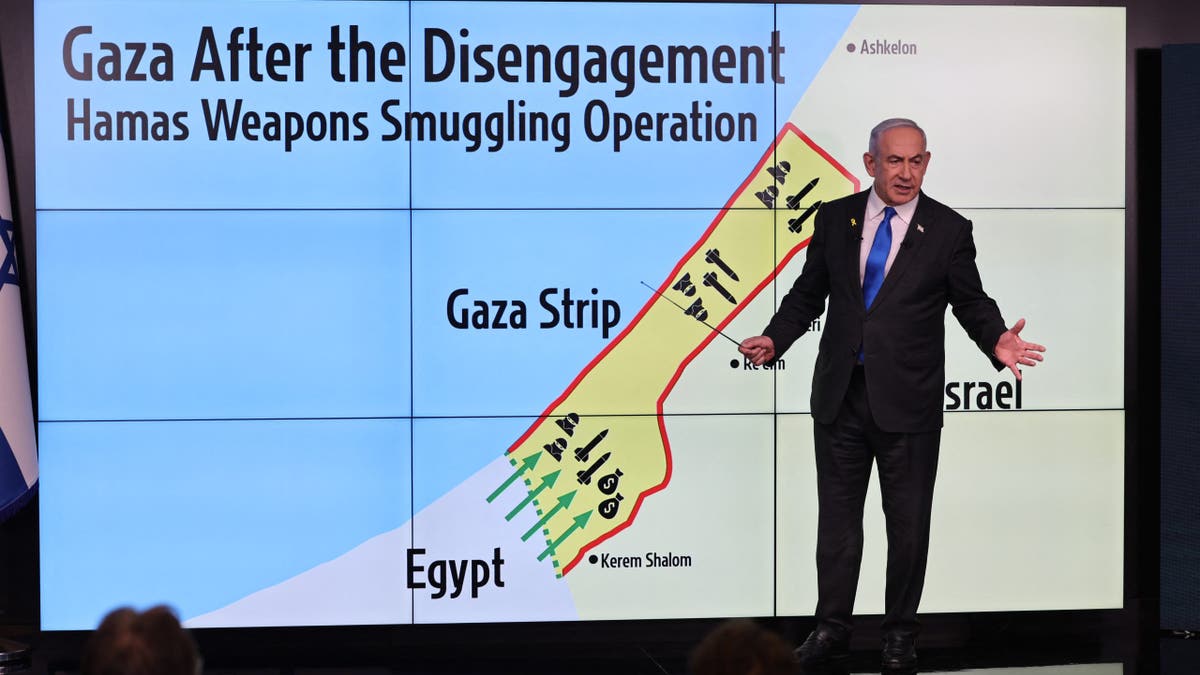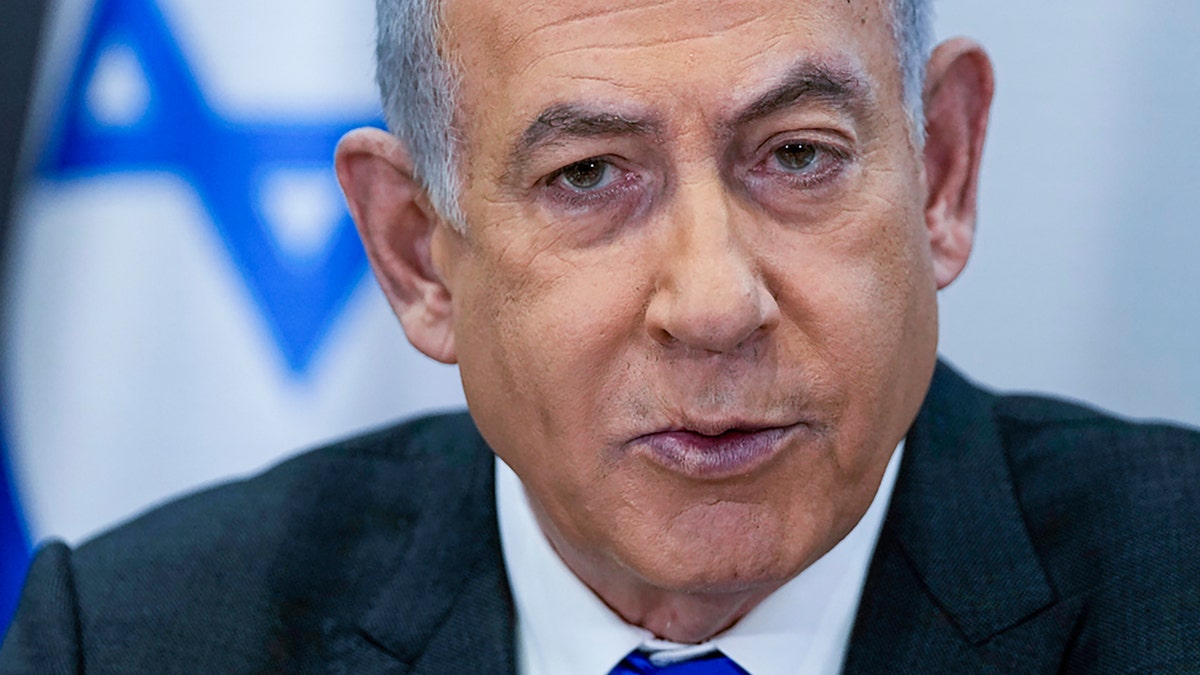
[ad_1]
Israel Prime Minister Benjamin Netanyahu is making clear that his forces will not agree to Hamas’ demands to vacate Gaza, for two crucial reasons – overall national security and ensuring the safe return of the remaining hostages still in Hamas captivity.
Concerns continue to mount that Hamas could look to smuggle some of the remaining 97 Israeli hostages still in captivity into the Sinai Peninsula in Egypt, which has long been deemed a haven for Islamic militant groups, and where they could then be transported to Yemen or Iran.
According to Netanyahu, the best way to prevent these Hamas hostage smuggling efforts is through maintaining the contested Philadelphi Route – a security corridor that runs between the Gaza Strip and Egypt.

Israel’s Prime Minister Benjamin Netanyahu points at a map of the Gaza Strip during a press conference at the Government Press Office (GPO) in Jerusalem on September 4, 2024. (Abir Sultan/POOL/AFP via Getty Images)
AMERICAN KILLED IN WEST BANK, STATE DEPARTMENT SAYS
“Hol[d] the Philadelphi corridor, because that possesses Hamas, that prevents them from rearming,” Netanhyu told Fox and Friends’ Brian Kilmeade. “It prevents Gaza from becoming this Iranian terror enclave again, which can threaten our existence.
“But it’s also the way to prevent them from smuggling hostages . . . into Egypt, into the Sinai, where they could disappear,” he added. “Then they’ll end up in Iran or in Yemen, and they’re lost forever.”
The prime minster’s comments echoed a report by The Jewish Chronicle that said Hamas chief Yahya Sinwar was hashing out a secret plan to smuggle himself, other Hamas leadership and some of the remaining Israeli hostages out of Gaza through the Philadelphi corridor before heading to Iran.
The chronicle cited Israeli intelligence sources, though other Israeli news outlets refuted the reporting Thursday, and Fox News Digital could not independently verify the intelligence.

Israeli combat engineers search for Hamas tunnels in the Philadelphi Corridor along the Gaza-Egypt border. (TPS-IL)
In his remarks to Fox News, Netanyahu did not expand on the leverage Hamas could gain by smuggling the hostages out of Gaza, but securing the hostages’ release has increasingly taken center stage in the ceasefire negotiations.
Following the assassination of six Israeli hostages who had been held prisoner by Hamas since the Oct. 7, 2023, attacks, and who were found in the tunnels mined by the terrorist organization last month, Netanyahu has increased his opposition to U.S. efforts to push through a cease-fire agreement.

American hostage Hersh Goldberg-Polin, 23, along with Eden Yerushalmi, 24, Carmel Gat, 40, Alex Lobanov, 32, Almog Sarusi, 27, and Ori Danino, 25, ‘brutally murdered’ by Hamas right before rescue – IDF. (Fox News)
Three of the hostages killed were reportedly supposed to be part of an exchange under a cease-fire deal proposed in July, but which never came to fruition.
“We’re doing everything we can to get the remainder [out],” Netanhyu said. “But Hamas consistently refuses to make a deal.”
Details of the ceasefire agreement put forward by the U.S., Qatar and Egypt have remained closely guarded for months, and reporting for weeks has suggested that the most recent deal signed on by Israel, but rebuffed by Hamas, was down to Jerusalem’s refusal to vacate the Philadelphi Route.
“It’s just a direct falsehood,” he said, noting that it is about more than just holding onto the corridor.
“What we have to do is to make sure that we do two things,” Netanyahu said. “One, get the hostages out. And second, keep the red lines that are necessary for Israel’s security and survival.
“I think both of them go through holding the Philadelphi corridor,” he added.
Despite Netanyahu’s strong opposition to ceding any hold of the strategic route and Hamas’ apparent refusal to hand over more hostages until Israel stops its operations in Gaza, Secretary of State Antony Blinken on Thursday said that negotiations were making significant headway.

Israeli Prime Minister Benjamin Netanyahu chairs a cabinet meeting at the Kirya military base, which houses the Israeli Ministry of Defense, in Tel Aviv, Israel, on Dec. 24, 2023. Top U.S. leaders have invited Israeli Prime Minister Benjamin Netanyahu to deliver an address to Congress. The visit would provide a show of wartime support for the longtime ally despite mounting political divisions over Israel’s military assault on Gaza. The invitation from House Speaker Mike Johnson, a Republican, and Senate Majority Leader Chuck Schumer, a Democrat, and the other leaders has been in the works for some time. (AP Photo/Ohad Zwigenberg, Pool, File)
CLICK HERE TO GET THE FOX NEWS APP
“I think based on what I’ve seen, 90 percent is agreed, but there are a few critical issues that remain where we need to be able to get agreement,” he told reporters. “Much of this has been discussed in recent days, including the Philadelphi corridor, including some of the exact specifics of how hostages and prisoners are exchanged.
“So that remains, but pretty much everything else is there,” he added.
Blinken said he expects in the “coming days” that an updated deal will be shared by Egypt and Qatar with Hamas and by the U.S. with Israel in an attempt to shore up a cease-fire agreement.
“Then it will be time really for the parties to decide yes or no, and then we’ll see,” he added.
[ad_2]
Source link